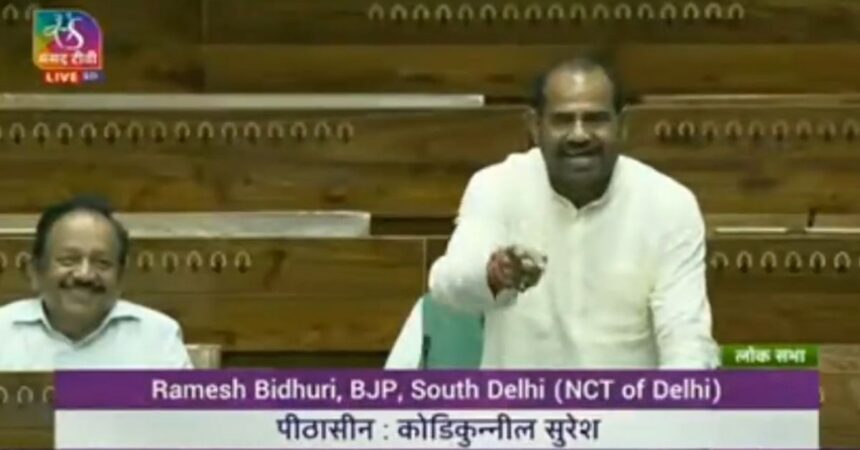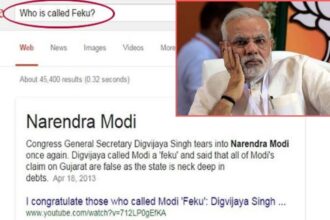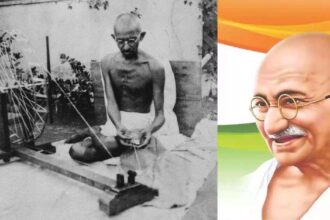A heated exchange between MPs Mahua Moitra and Ramesh Bidhuri in the Lok Sabha has sparked outrage and calls for action. The bitter war of words highlights growing religious polarization in Indian politics.
The controversy erupted during a parliamentary discussion when Bidhuri, a BJP MP, targeted fellow MP Danish Ali with inflammatory religious slurs and hate speech. Moitra, a firebrand Trinamool Congress MP, hit back at Bidhuri for his unacceptable remarks.
What Exactly Did Ramesh Bidhuri Say?
Video footage reveals Bidhuri verbally attacking Ali, using derogatory terms like “pimp”, “circumcised”, “Muslim terrorist”, and more. His unparliamentary language provoked shock and condemnation from MPs across party lines. Bidhuri’s remarks were expunged from records and he was warned of consequences by the Speaker.
However, many felt this mild admonishment was inadequate for such blatant hate speech. Bidhuri’s words reflect a disturbing normalization of animosity toward Muslims in today’s political discourse, as critiqued by observers.
How Did Moitra Respond to Ramesh Bidhuri?
Known for her bold, progressive politics, Moitra jumped to Ali’s defense. She called out Bidhuri’s hateful speech in a viral social media post, demanding action be taken to make an example of him.
Moitra highlighted the stark contrast between Bidhuri’s inflammatory remarks and the suspension of opposition MPs for trivial reasons. Her post tagged the PM, BJP chief and Speaker, directly confronting them on the party’s tacit endorsement of such communal politics, as alleged by critics.
What Was the Wider Reaction?
Moitra’s criticism of Bidhuri’s hate speech found loud support from across the opposition. Leaders like Omar Abdullah called out the acute religious polarization pervading politics today. Congress deemed Bidhuri’s muted apology orchestrated by the BJP an eyewash.
Voices across ideological lines concurred that permitting such communal hatred from elected representatives normalizes the politicization of religion. Many saw it as a dangerous marker of rising intolerance and majoritarianism that directly contradicts constitutional secularism, as argued by analysts.
What Does This Mean for Parliamentary Conduct?
The Bidhuri-Moitra furore has triggered debate on acceptable parliamentary conduct. Many argue Bidhuri’s unrepentant hate speech warrants suspension, not just routine expunging.
More broadly, it highlights the need to root out inflammatory commute-baiting for political gain, according to observers. As Abdullah noted, how can BJP supporters and minorities coexist amid such vociferous othering of Muslims? All parties must reflect on the ethics of punching down against marginalized groups, say analysts.
Is Hate Speech a Systemic Parliamentary Problem?
While Bidhuri’s remarks were exceptionally crass, observers note he is far from the only offender. Hate speech targeting minorities, especially Muslims, is rampant in the Modi era, as alleged by critics.
Even the prime minister has faced accusations of dog whistle politics. Meanwhile, BJP leaders often make news for divisive, inflammatory utterances against marginalized groups. Most escape with bland critiques, if any censure at all, argue analysts.
What is Driving This Kind of Politics?
Analysts tie the surge in inflammatory, majoritarian rhetoric to the Hindu nationalist ideology of India’s ruling party. Othering Muslims helps consolidate the BJP’s traditional Hindu vote bank, as per observers. Naked communal polarization serves the party’s electoral interests, say analysts.
Hence, critics argue BJP leaders implicitly, and sometimes explicitly, endorse confrontational anti-minority politics among their ranks. At the very least, they turn a blind eye to the clear communal undertones in the words and actions of many party colleagues, as alleged.
Is the Opposition Immune from Communal Politics?
However, the opposition is not blameless either, often pandering to similar identity politics. Congress has been accused of soft hindutva politics. Moreover, caste and religion remain exploitable fault lines across parties, say analysts.
Observers say that beyond partisan finger-pointing, there is urgent need for collective action to eliminate the toxicity of identity politics from public discourse. All sides must reflect on their role in furthering an us versus them political narrative.
What Next for Bidhuri?
It remains to be seen if Bidhuri will face real consequences. The BJP has issued him a show cause notice, but many doubt meaningful action is forthcoming. At most, he may get away with a rap on the knuckles, as per analysts.
Nonetheless, the severity of public condemnation, even from unexpected quarters, indicates Bidhuri may have crossed a line. Will this hubris come back to bite him and the BJP? Or will he escape with a minor slap on the wrist? Only time will tell, say observers.
In summary, Mahua Moitra’s calling-out of Ramesh Bidhuri’s communal rhetoric has ignited discussion on rising religious polarization in Indian politics and the role of inflammatory identity politics across parties. The parliamentary exchange has renewed scrutiny on systemic tolerance of hate speech targeting minorities in the country.


























